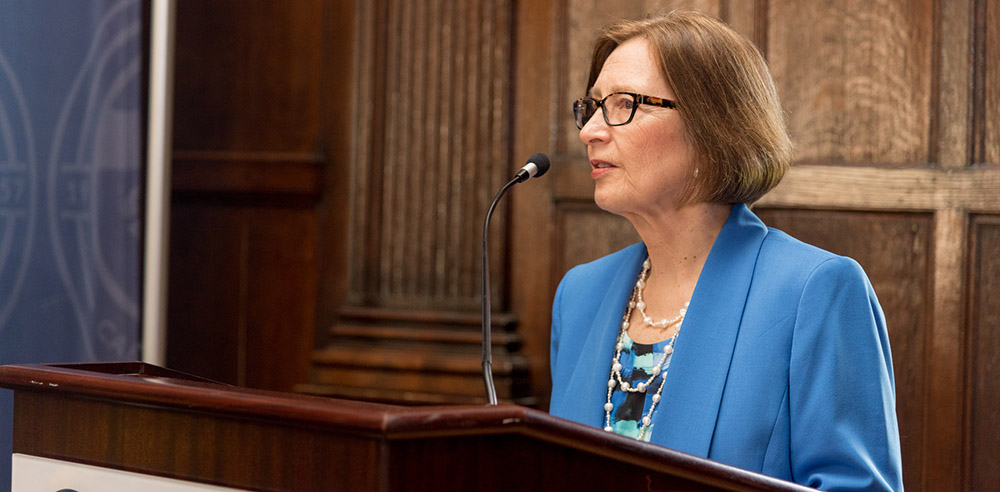In a ceremony and reception held April 12 at the Mansion, Beth E. Sturman, Executive Director of Laurel House, a comprehensive domestic violence service and prevention agency based in Montgomery County, PA, was awarded the 2018 Ivy Young Willis & Martha Willis Dale Award, an acknowledgment of Sturman’s more than 30 years of experience in human services.
Presented annually, the award honors a woman who has made a noteworthy contribution to the civic life of her community: local, regional, national, or international.
Sturman, who’s served as Executive Director of Laurel House since 2005, has worked with numbers of underprivileged populations in her career, and has been involved in social advocacy since childhood.
Born to socially conscious parents, Sturman grew up attending Civil Rights marches and rallies. At age 9, living in Georgia for one summer, Sturman was exposed to segregated water fountains. “It was a dose of reality,” she said. “As a child, I was raised to believe that we’re all here to help each other, that we’re all here to help make the world a little bit better and to help make life a little bit easier for the people around us as well as in the world as a whole.”
Sturman’s mother cared for two families who had children who were profoundly disabled during Sturman’s middle and high school years, which, she said, helped Sturman recognize the adversities that people face every day and inspired her to find her own path.
“People are faced with so many different challenges that I just didn’t have any understanding of, any recognition of, and what it takes to face those kinds of challenges every day,” said Sturman. “That inspired me to keep going and try to figure out where my calling was in the world, what my way of giving back and making better might be.
“I was privileged to work with a lot of different human service populations—families who had children with developmental disabilities, cognitive and physical limitations, drug and alcohol populations, intergenerational poverty, homelessness, mental health, many different kinds of populations,” said Sturman. “It didn’t really seem to matter what socioeconomic level or where that family started. We all need help. We all have a lot of different things to contend with, some challenges are bigger than others, but the need is always there.
“There are a lot of ways we can make a difference. We can make a difference whether we’re working in human services or we can make a difference just by being a good listening hear for somebody else who needs a shoulder.”
In a conversation moderated by Joseph R. Fitzgerald, PhD, Assistant Professor, History and Political Science, Sturman shared not only the complexities of the human services field, but also the importance of listening.
“The reality of what I was taught in a classroom about what it was going to be like to do any kind of human service work isn’t really how it is,” said Sturman. “To realize the complexity—if I went on a home visit for a family who had a child with down syndrome, that might have been the least of the issues that family was contending with. I learned to build a relationship, invest the time and the energy in the relationship, so that they would open up and share about the other things that were troubling them.
“I think it’s really important to listen, to take in and really hear what the other person is saying. It’s important for us to listen to the people we serve, because they know more about what they need than we do, and to listen with an open mind.”
Darryl Mace, PhD, Chair and Associate Professor, History and Political Science, as well as the evening’s emcee, reiterated Sturman’s emphasis on the importance of listening. “Networking, connecting, meeting people where they are, all that starts with listening,” said Mace. “If we start to really listen to one another, start to engage in authentic dialogue, we can really begin to solve a lot of the things that are happening in our little corner of the world, and with everybody working in their little corner of the world, then we can make some real change.”
Acknowledging her parents’ influence, she also commented on what it really means to be a change agent.
“My father had great faith that young people were going to change the world,” said Sturman. “In a lot of ways, we have, but I know we have a long ways to go. It takes longer than I ever thought it would take, it’s so much harder than I ever thought it would be, but it’s worth every minute of putting my heart and soul and all of our heart and souls into doing whatever we’re called to do to try to help make things just a little bit better, for the next generation and for the people around us.”
See more photos from the event in Cabrini’s Flickr album.
